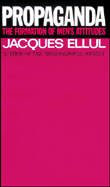|
Book Review: Propaganda
Reviewed by Geoff Beck
26 November 2005
[Propaganda, by Jacques Ellul. Vintage Press, 1965.]
 Unplug your TV set now.
Unplug your TV set now.
I'm far more pessimistic about our chances to prevail than I was before
reading Propaganda. My notions of what propaganda is, I discovered, are
antique and inadequate. Ellul argues that propaganda is a
prerequisite for any technological society and that it must be seamless and
total. His uses the term "Total Propaganda" to describe the combined effect
of radio, magazines, newspapers, books, movies, billboards, public service
announcements: a presence "which leaves no part of the intellectual or
emotional life alone; man is surrounded on all sides."
Provoked by Ellul's book I broached the topic of propaganda with my
coworkers, and most, I discovered, believe they can recognize
propaganda. Most are assured there is little propaganda, if any, in today's
society; while others said propaganda exists only in Saddam's Iraq and
Hitler's Germany, and other "undemocratic" states. For my coworkers
propaganda is a blunt hammer by which the gullible (which they all assume
does not include them) in undemocratic societies are unwillingly beaten into
submission. Propaganda is harsh and heavy-handed, they all thought. Some I
spoke with confided that propaganda exists within the American Negro
community, attributing the outlandish invention claims to propaganda; but
all I spoke with felt their lives were unfettered by propaganda, and if they
were exposed to propaganda they could easily nullify its effects since "we
live in a open and free society," they said.
According to Ellul, the very purpose of propaganda is to make the mass feel
comfortable, assured, and secure. Propaganda, says Ellul, must never appear
harsh and heavy-handed; so comfortable and secure the masses must feel with
the propaganda line that if some event contradicts it the affected group or
individual by reflex must react with outrage and offense. The person
influenced by propaganda "is clearly subhuman, but pretends to be
superhuman; he is more suggestible, but pretends to be forcible; he is more
unstable but pretends to be firm in his convictions," says Ellul.
To judge the effectiveness of current propaganda ask these questions to the
average Joe or Sally: don't you think blacks are generally less intelligent
than whites, and that they are more prone to murder and more likely to be
AIDS infected than whites? Now note the reflex reaction. If you really to
want a strong reflex reaction tell them you doubt six million Jews were
killed in the 'Holocaust.' Yes, there may be reports in the controlled media
lowering the death count of the 'Holocaust' and stating that blacks are more
likely to be infected with AIDS and more likely to murder, but they aren't
repeated often enough to affect the masses' psyche.
The late William Pierce spoke often about the effect of propaganda upon the
masses, and it was from his broadcasts that I first learned of Ellul's book.
Pierce, perhaps taking a cue from Ellul, understood that propaganda was a
necessary and permanent fixture in a modern technological society such as
our own, and that the vast majority of the population -- the herd -- was
forever at its mercy. The goal, according to Pierce was not to eliminate propaganda, but to overcome the enemy's propaganda with counter-propaganda.
In any case propaganda is too necessary, ubiquitous, and entrenched in
modern societies to be done away with, and short of returning to a pastoral existence there
is no removing it. This Ellul emphasizes. Jew-run Hollywood often portrays propaganda campaigns, such as those conducted in Nazi Germany, as clumsy and overbearing. Propaganda, we
are taught, is a malevolent force attacking the higher and nobler virtues of a people. But this is
not so.
Ellul tells us propaganda appeals to those ideas, myths, and virtues held
dearest, and it never seeks their elimination: "existing opinion is not to
be contradicted, but utilized." From these customs and virtues the
propagandist "must select those easiest to mobilize those that will give the
greatest strength to the action he wants to precipitate."
For example it was by manipulating the myth of "progress" that propagandists
undermined our race's healthy prejudices against blacks. Similarly, today's
propagandists manipulate the myth of "equality" among America's European
folk to justify alien concepts of multiculturalism and mass third-world
immigration, both causes central to organized Jewry's agenda in the United
States.
Rather than attempting to undermine faulty notions of equality and
progress in the American psyche it might be more effective for White
Nationalists to develop propaganda turning these entrenched myths to our own purposes. Perhaps an effective tactic might be one which defends equality and progress by suggesting that
blacks and browns threaten them.
"I am an American"
Another aspect of propaganda we fail to understand is its timeliness.
Alacrity gives propaganda a "seductive excitement and a capacity to move
[the individual and group] by its ties to volatile immediacy."
 Most will recall the so called "I am an American" public service
announcement, or PSA, that appeared shortly after 9-11. This PSA* featured a slideshow of brown faces declaring they too are Americans. It is a testament to the established organs of
propaganda in the United States that only hours after 19 Arabs hijacked
American planes and crashed them into American buildings, an effective
propaganda campaign was unleashed to blunt any natural inclination to
interpret the attacks in racial terms (as was the case in 1941 with the
Japanese attack on Pearl Harbor). As you will learn from Ellul's book such
propaganda events as the "I am an American" campaign are only one small part
-- however prominent -- in a decades-old propaganda strategy, a strategy Ellul
terms "pre-Propaganda."
Most will recall the so called "I am an American" public service
announcement, or PSA, that appeared shortly after 9-11. This PSA* featured a slideshow of brown faces declaring they too are Americans. It is a testament to the established organs of
propaganda in the United States that only hours after 19 Arabs hijacked
American planes and crashed them into American buildings, an effective
propaganda campaign was unleashed to blunt any natural inclination to
interpret the attacks in racial terms (as was the case in 1941 with the
Japanese attack on Pearl Harbor). As you will learn from Ellul's book such
propaganda events as the "I am an American" campaign are only one small part
-- however prominent -- in a decades-old propaganda strategy, a strategy Ellul
terms "pre-Propaganda."
Again, many imagine that propaganda is antique tool, a relic of the cold
war. In fact, propaganda is: "based on current news, it cannot permit time
for reflection, thought, or dialogue. A man caught up in the news must
remain on the surface of the event; ... there is never any awareness -- of
himself, of his condition, of his society -- for the man who lives by current
events... one thought drives away another; old facts are driven out by new
ones."
Ellul stresses the importance of fads, trends, and styles as a conveyor of
the propagandist's message. With the advent of 24-hour cable news and
computer-assisted market research the power of the propagandist has
been greatly amplified.
Propaganda is a book written in scholarly tone and its focus is propaganda,
rather than an exposé of any specific government, or theme such a Jewish media
control. Propaganda was written in 1965 so its anecdotes and references
are dated, but readers with an understanding of twentieth-century
cold war politics will fare well. I suspect most readers will, after
reading Ellul's book, be surprised at the scale of propaganda in contemporary
society; most will discover propaganda is something not easily detectable;
and most will, I predict, understand the vast majority of Americans are
under its merciless effects and will blissfully remain so, feeling they are
being trendy.
GEOFF BECK
* More information on PSA "I am an American" is here:
http://www.adcouncil.org/campaigns/historic_american . Notice the Ad
Council's motto: "We marshal the volunteer forces of advertising agencies
and media companies to effect positive social change."
|